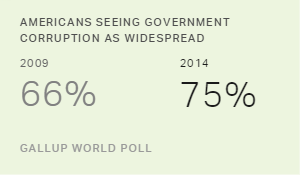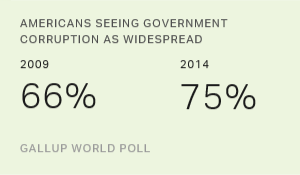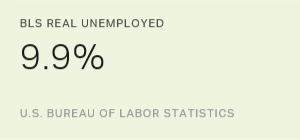This blog post is part of an ongoing series that originated with Killing Small Business.
It's been fashionable to make jokes about Congress' historically low approval ratings, unbelievable incompetence in the government and now, unfortunately, the perception of widespread government corruption. Pundits and talk-radio hosts have a field day with this. So do late-night comics.
It's not funny anymore.
A staggering 75% of the American public believe corruption is "widespread" in the U.S. government. Not incompetence, but corruption. This alarming figure has held steady since 2010, up from 66% in 2009.
This sense of corruption probably contributes to much of the extreme anxiety and unrest we see today -- including protests, lower voter turnout and increased interest in guns.

Guns -- a symbol of freedom from government tyranny to many people -- are now a key voting issue. A quarter of U.S. voters say the presidential candidate they vote for must share their view on guns.
Protests are growing in cities and campuses all around the country. Students and citizens generally have lost faith in their national institutions -- the biggest and most powerful of which is, of course, the federal government.
The last presidential election had an estimated 5 million fewer voters than turned out in 2008, and the 2014 midterm elections saw the lowest turnout in 72 years (36.3%). At alarming levels, citizens -- when invited to participate directly in their own democracy -- are taking a pass and staying home. Or taking their frustrations to the streets.
The perception that there's widespread corruption in the national government could be a symptom of citizen disengagement and anger. Or it could be a cause -- we don't know. But it's very possible this is a big, dark cloud that hangs over this country's progress. And it might be fueling the rise of an unlikely, non-traditional leading Republican candidate for the presidency, Donald Trump.
To make matters worse, that dark cloud appears to be hanging over the growth of small business, which is where virtually all new GDP growth and good jobs originate. Simply put, startups and shootups (small businesses that grow larger) have been in a death spiral. The U.S. Census Bureau reported that the total number of business startups and business closures per year crossed for the first time in 2008.
And the economy isn't growing nearly fast enough -- it's been running at an average rate of 2% since the 2008 financial collapse and the Great Recession. Just to compare, following the recession of 1981-1982, GDP grew for six years at 4.5% -- one of our greatest economic eras in history.
Jobs haven't come back. According to the U.S. Bureau of Labor Statistics, the percentage of the total adult population that has a full-time job has been hovering around 48% since 2010 -- the lowest full-time employment level since 1983. This is why the middle class has been dangerously shrinking.
You don't have to connect too many dots to conclude that if a government has an alarmingly high appearance of widespread corruption -- and that same government creates regulations that businesses cite as a leading barrier to growth -- then entrepreneurs might be reluctant to stick their necks out to start a business. Or to boom the businesses they already have.
Why would they start or boom a business if they think a corrupt government is creating rules and regulations that don't serve their interests -- but rather rules that serve the interests of corrupt officials, corrupt politicians, corrupt insiders and corrupt special interest groups?
Any wonder why so many Americans want a candidate who's outside of that system?


